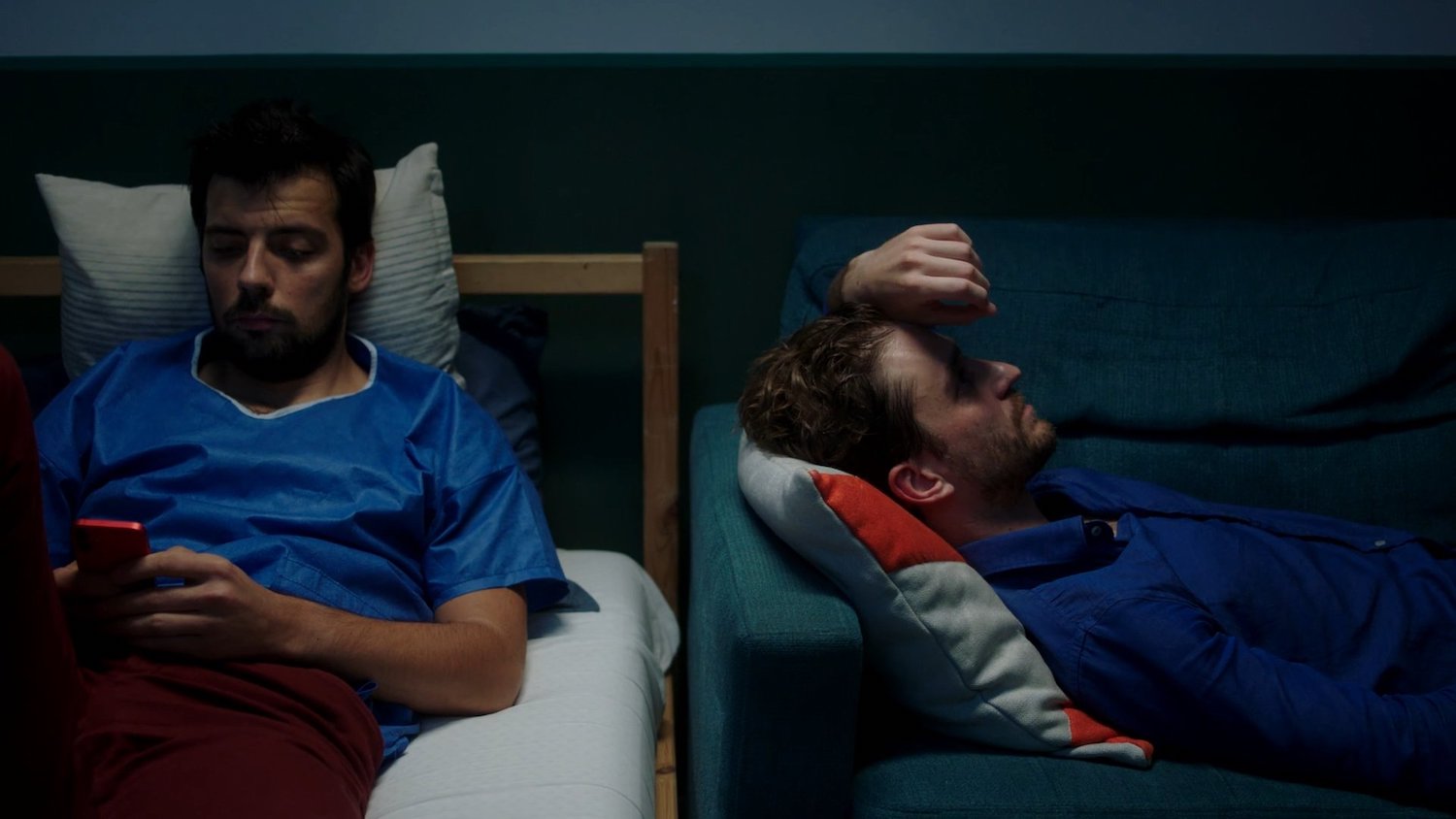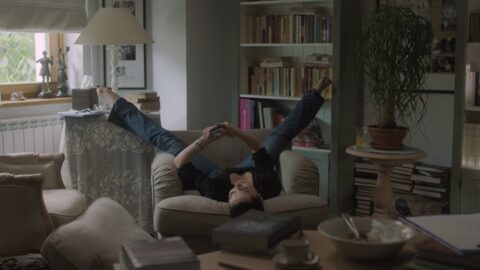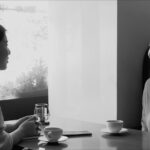Few countries in the world experienced quite the cultural divide over the coronavirus pandemic as Romania. While doctors and health experts promoted the idea of lockdowns and masks as simple common sense, vocal voices from the other side compared these health measures to fascism and the reign of Nicolae Ceaușescu. This political, suspicious, paranoid edge is best exemplified by Radu Jude’s excellent Golden Bear winner Bad Luck Banging or Loony Porn (2021), which expertly tackles these paradoxes and cultural schisms head-on.
One particularly critical voice was Romanian New Wave progenitor Cristi Puiu himself, who refused to wear a mask when introducing Malmkrog (2020) at Cluj Napoca, saying it was inhumane to keep one on for 200 minutes. He went on to say that “the political power who rules at this moment (the National Liberal Party) should have talked to us, not treated us like cattle!” These comments didn’t go down well in the wider cultural sphere. He was replaced by Matt Dillon on the Venice Jury that same year due to “unexpected difficulties” that may or may not have been coronavirus-related.
It’s worth pointing out that his comments, like many so-called coronavirus pariahs, weren’t that bad, especially as he didn’t deny the virus’ existence and said he respected distancing as and when he could. It was also perhaps taken out of context in the Western media, who knew next to nothing as to how the lockdown measures were implemented in Romania specifically. Nonetheless, it speaks to the director’s ability to whip up controversy, whether it’s through his punishing runtimes, bitterly dark themes, austere cinematography or reputation for running a harsh set. His latest is no exception.
Following up his (unfairly maligned) masterpiece Malmkrog with a return to the Romanian language, his anthology film MMXX (2023) — denoting its period in Roman numerals — revisits his annus horribilis, resulting in a mixed-grab-bag of ideas that somewhat clarify his views on the socio-political effects of the virus. At turns amusing and grimly dark, yet always punishingly austere, these four separate yet interrelated short films have COVID-19 either as the theme or as the backdrop. The results are, naturally, mixed, making for a minor effort compared to his best work such as Sieranevada (2016) or The Death of Mr. Lazerescu (2005).
In the first segment, “Sempre Libera,” Bianca Cuculici stars as Oana Pfifer, a young therapist taking a home visit from a narcissistic female patient named Cezara (Roxana Ogrendil). At first, she appears content, introduced with her legs spread akimbo across her expensive Poltrona Frau while the eponymous Verdi aria from La Traviata — talking of its protagonist’s desire for freedom and contentment — blares in the background.
But cracks appear beneath the surface as she asks Cezara to rank questions such as “Do you feel the world is against you?” or “Do you feel like a disappointment to yourself” on a scale between 1-5. Shot entirely from one fixed vantage point, the apartment is cut in two; the corridor and the living room split by a fresh bouquet of flowers. Domestic and personal bliss is hard to achieve in an era of social distancing, mask-wearing and nasty, unwelcome intrusions. Never quite reaching any definitive conclusion, it’s nonetheless a fine, unsettling, curtain-opener.
Oana reappears in the second segment, “Baba au Rhum,” alongside her brother Mihai (Laurențiu Bondarenco), who made a brief cameo in the first short. Here, a Kitchen Aid replaces the Poltrona Frau as a middle-class signifier. But many of the pieces are missing, resulting in frantic back-to-back calls with their parents. Puiu, working with cinematographers Ivan Grincenco and Silviu Stavilã, switches the fixed camera for a quick-cutting handheld style, getting great mileage out of a tiny kitchen and the search for various bowls, whips and plastic covers.
Once again, this minor debate about making the perfect cake — such as not using cheap Havana rum — is a microcosm of the bigger issue to come; a pregnant friend with COVID-19 being administered to the hospital for abdominal pains. Soon legal and ethical issues prevail, resulting in tens more phone calls to check if she is OK, showing the inhumanity of the medical authorities’ approach to containing the virus. Perhaps the best short of the four, it details Puiu’s ability to expertly wring tension and conflict out of seemingly innocuous domestic scenes.

Her husband Septimiu (Florin Țibre) appears to be in quarantine himself in the third segment, “Norma Jeane Mortenson,” checking himself twice for coronavirus through rapid testing as he listens to his Moldovan colleague Giani (Dorian Boguţă) explain how he fell in love and slept with the Moldovan equivalent of Marilyn Monroe (neé Mortenson) only to find out she was the mistress of a dangerous mafioso. The type of authentic conversation only two men alone could conduct about the ins and outs of having sex with a beautiful woman, filled with twists and turns and the very real threat of Giani being murdered by cruel gangsters, it keeps us invested despite the simplistic one-take set up; one man lying on a bed, the other lying next to him cross-wise on a couch. And the finale is the chef’s kiss, making you realise that the entire premise is far different from what you may have imagined.
This threat of cross-border organised crime spills over into the final segment, “8th July,” (titled in Cyrillic for some reason), which evokes Puiu’s debut Stuff and Dough (2001) in its opening sequence, with detective Narcis Patranescu (Dragoș Bucur) shot from the back of a car, driving to a crime scene. Looking the most like a stereotypical Romanian New Wave film, mixing the banality of police work with long takes and chauvinistic conversations, the detective’s investigations play out against an Orthodox funeral, unveiling a horrific crime scheme spanning from Romania to Austria, spearheaded by a mysterious man known only as “Santa Claus.” Filled with dread and horror, it ends the entire project on a downer, Puiu’s state-of-the-nation address expanding beyond the virus and into something else entirely, something inexplicably dark and evil.
Individually, they’re all excellent, together they become a slog. The best anthology films, especially ones where every story is by the same director, such as There Is No Evil (Mohammad Rasoulof, 2020) or Wild Tales (Damián Szifron, 2014), work best when there is a sense of forward momentum between each segment. The viewer should get a sense that we are building towards something bigger or more emotional, even if the mood of the piece changes.
With MMXX, the stakes might get larger, but due to Puiu’s stringent style, the vibe feels more or less the same. Thematic and aesthetic unity prevails, and each short/mid-length feature is pretty effective, but it comes at the expense of congenial unity, especially as the complete film approaches the 160-minute mark. Perhaps it’s the kind of rich text that’s worth visiting again, to dig deeper into those themes between the shorts, linked in their title sequences by a camera ever-panning across a field filled with various detritus. I certainly found myself appreciating the film more as I wrote about its various segments.
It’s certainly a throat-clearer over his position on the virus, raising potent points about its ability to ferment authoritarianism and sow social discord, yet MMXX lacks a certain punch to justify not only its intense total length but the forty-minute plus length of each individual short. While certainly one of the most original and worthwhile directors out there, I can’t help but feel that the anthology format is anathema to his style — where even his longest, most painful films, such as Aurora (2010), build expertly towards a provocative conclusion.
I also can’t help but feel that the coronavirus has been somewhat of a losing battle for Puiu; not only has the film been released two years after Jude’s somewhat definitive, and far more amusing, statement on the matter, but it lacks the fertile ground for discussion that philosopher Vladimir Solovyov’s texts brought to Malmkrog. While challenging on a durational sense, on an intellectual level, I found his latest highly wanting.
Redmond is the editor-in-chief of Journey Into Cinema.





